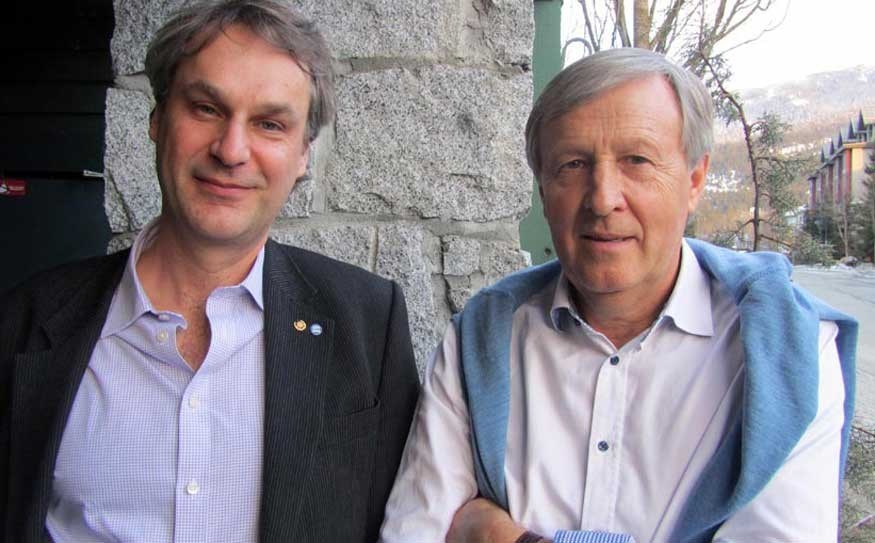Two of the leading lights of the Natural Step theory of sustainable living happen to be Swedes, happen to be friends, and happened to be in Whistler last Thursday (Feb. 23) on a mission to taste powder.
Dr. Göran Carstedt took time away from the slopes to speak to a gathering of 50 Whistler politicians and business owners at Alta Bistro in support of the resort's use of Natural Step through Whistler 2020, and the future. The current chairman of the Natural Step International, which takes a scientific approach to sustainable development, Carstedt has led a distinguished business career as former president of IKEA North America and manager of market planning at Volvo. He last spoke in the resort in 2009.
Natural Step has been around for over 20 years; the not-for-profit organization's aim is to provide a toolbox to bring the many good practices of sustainability together for communities and businesses to design their own infrastructure systems. Whistler 2020 took up the challenge to provide a sustainable approach to planning in the resort municipality.
He and his colleague Dr. John Holmberg, the vice president for Chalmers University of Technology in Gothenburg with responsibility for the Systems and Environment Initiative, spoke to Pique following the address.
The two scientists said they had been visiting Portland, Vancouver and Whistler to catch up on local programs like Whistler 2020 and sustainability initiatives fostered by the University of British Columbia.
Much of this trip centred around the future aims of Natural Step.
"We are trying to learn from each other," Holmberg said.
Carstedt continues to be impressed by the Whistler 2020 sustainability program, and both he and Holmberg were interested in investigating grassroots programs while on their visit — that included looking at initiatives at the University of B.C.
"When you have this plan for the greenest city, things happen that (people) are not aware of," Carstedt said. "The bottom-up perspective is very interesting, how the students connect the university with Vancouver... the question is what kind of idea can create energy (to ensure success)."
Holmberg's work broadly explores what wellbeing means, how sustainability is part of this, and he believes Whistler shows where the two intersect, with the added bonus of being on nature's front doorstep.
"The question in Whistler, now, is what will be the idea that will create the energy to be part of it, to create the good idea, the right idea. We see very clearly that here, (the emphasis on) wellbeing. You are here to enjoy life," he said.
Carstedt listed Nike and Volvo among the leaders of the movement, and said Whistler specifically and Canada more generally had a lot to teach the world.
"What you have now is so good," added Carstedt. "For 10 year of hard work, there has been very hard work on the ecological part, biodiversity... reducing the (ecological) footprint."
"We are transforming the International Natural Step as an organization into a more open organization, to involve more people," said Carstedt. "In Sweden, as a country, we educated all children in schools in the early 90s and that success stands today.
"The Natural Step (when it started) was important because people did not know what sustainability was all about, and thought sustainability was only something for a department of the environment. Instead, it needs to be in the core of the strategy of the company."
Now that more people and organizations realize this, Holmberg said, the Natural Step aims o look at new options to educate and encourage. He returned to very basic questions.
"What will be the future society? Why are (companies) in business? What is the future of IT?..." he asked.
"Canada and Sweden have a lot in common: nature, few people, a lot of land, we are both northern, it is harsh to survive, we have hockey... but we believe in creating a society of more equals."
The current economic climate in the world has negatively hit the attention paid — and money spent — on sustainability by governments and corporations, but Holmberg said this shortsightedness means there will be greater struggles to make sustainability work in the future. China and Germany are going heavily in this direction and North America ignores this "business imperative" at their peril.
"The question is that when you have a stable situation the question is how do you use it to create change," said Holmberg.
"How can we put forward environmental concerns, but also how can we put forward these ideas in the market? It is clear that with declining resources the future market will be about sustainability. The most efficient production system, when it comes to resources, will be the winners in future.
"The issue is about (thinking) 10 years in the future... are you concerned about more than the next three years?"
All companies and governments need to be challenged on this, he said. Long-term approaches can be ignored for the next election, but what then?
"Why don't they turn it around? That is my point," said Carstedt. "We are all about results, about the bottom line... (with sustainability) which company do you think will be the winner 15 years ahead?"




